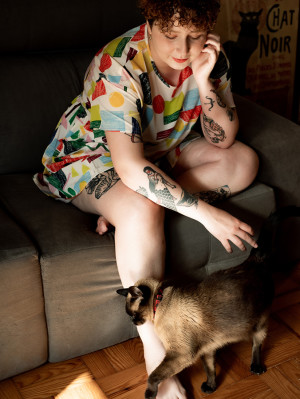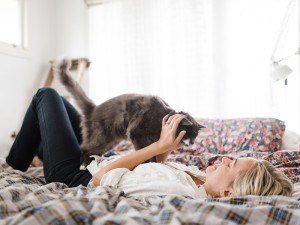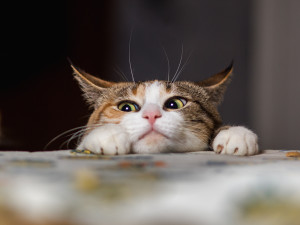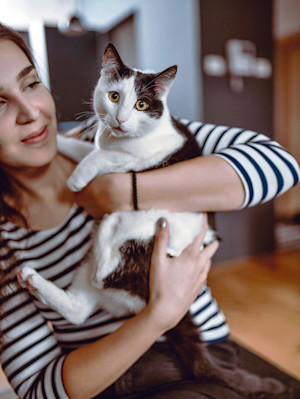Can Cats Really Predict Death?
Seventeen years ago, one unique kitty inspired the question, and experts remain curious to this day.
In 2007, the New England Journal of Medicine published an article opens in new tab about a cat named Oscar who roamed the halls of the Steere House Nursing and Rehabilitation Center in Providence, Rhode Island. He was adopted two years earlier to become the nursing home’s therapy cat, comforting the residents through their golden years. However, the staff soon realized he offered a different and much more unique comfort. Oscar was seemingly able to predict when one of the residents was going to die.
According to the report, Oscar would curl up in bed purring with specific individuals in the hours before they passed. This wasn’t written by some quack seeking attention or someone processing their grief in a bizarre way, either. The paper, “A Day in the Life of Oscar the Cat”, was written by Dr. David Dosa, a Steere House geriatrician and health services researcher at Brown University.
Save on the litter with color-changing tech that helps you better care for your cat.
The legacy of Oscar the Cat
The impact Oscar had at Steere House is perfectly captured with the story of a resident referred to as Mrs. K. After Mrs. K’s nurse noticed Oscar in bed with her one day, she quickly called her loved ones. Understanding the significance of Oscar’s presence, they arrived within the hour. “A young grandson asks his mother, ‘What is the cat doing here?’ The mother, fighting back tears, tells him, ‘He is here to help Grandma get to heaven.’ Thirty minutes later, Mrs. K takes her last earthly breath,” Dr. Dosa writes.
Now, if this all sounds like a more interesting version of Stephen King’s, let’s say, misguided sequel to The Shining, you’re not wrong. While promoting the release of Doctor Sleep, King himself confirmed Oscar’s story inspired it. Dr. Dosa’s article drew a lot of eyeballs from cat lovers and animal professionals when it was first released. This led the Brown researcher to write what became a New York Times best seller expanding on his experiences with Oscar in 2010. Both House and The Simpsons even have episodes largely influenced by the OG Doctor Sleep.
How much do you spend on your pet per year?
Sadly, Oscar passed away in 2022 at the age of 17, leaving behind a legacy of both wonder and curiosity. It’s believed he ultimately predicted over 100 deaths in his lifetime, but is this really in the realm of possibility? After chatting with a couple of cat behaviorists, the answer to that question is more optimistic than you might think.
Can cats seriously predict death?
It may seem like a ridiculous concept but there is behavioral evidence supporting what the staff and residents of Steere House saw. Joey Lusvardi, cat behaviorist and founder of Class Act Catsopens in new tab in Minneapolis, Minnesota, explains that on the surface we can’t definitively say whether a cat like Oscar 100 percent understands somebody is about to die because our communication with them can only go so far. But that doesn’t mean it’s completely out of the question. “It’s absolutely within the realm of possibility that a cat may learn to recognize some of the subtle cues that someone is nearing the end,” he says.
Lusvardi adds that cats are, in general, great at recognizing human behaviors. This is especially true when these actions result in something the cat wants or enjoys. He points to additional attention a therapy cat may receive from the patient or even staff members in these end-of-life situations. It’s also possible that Oscar might have just liked the breathing patterns of people near the end of their lives. He may have noticed their decreasing mobility or changing body temperature, as well.
The behaviorist also notes it’s entirely conceivable that Oscar was picking up on subtle changes in the staff’s behavior and how they might respond to a patient who’s near the end. “For example, if a staff member begins going into the room slightly sooner than they normally would, he may interpret it as a signal that spending more time in that room may result in attention,” Lusvardi says.
Stephen Quandt, founder of Stephen Quandt Feline Behavior Associatesopens in new tab, offers another theory: the cat could smell impending death. “A person who is slowly dying seems to give off subtle odors, my recollection is something called ketones that an animal, and possibly even people can smell. Ketones are acids that the body uses in the absence of glucose for energy and results from the breakdown of fats to give the body fuel,” he explains.
Lusvardi agrees with this idea, adding that in the hours leading up to death, the body will release certain chemicals as organs begin to shut down. These chemicals can then be detected in the blood where cats may track the changing scent. “Cats have incredible senses of smell so picking up on subtle changes in the composition of your blood is very realistic,” he explains.
This exact explanation was even hinted at in Dr. Dosa’s original article. This is how he describes Oscar’s initial encounter with Mrs. K before the nurse decided it was time to call in her family to say goodbye. “Oscar jumps onto her bed and again sniffs the air. He pauses to consider the situation and then turns around twice before curling up beside Mrs. K,” Dr. Dosa writes.
There are, of course, other possibilities.
For years, pet parents have reported cats shifting behavior toward someone right before they died. Usually, these stories involve them giving someone extra attention or becoming clingier than normal. While Oscar’s apparent ability gives these tales a glimmer of credibility, we shouldn’t assume every cat instinctively knows when the Grim Reaper is at your door. It’s more likely they’re simply responding to changes in that person’s own behavior.
When someone is ill or near the end of their life, they may start to exhibit changes in their daily activities including how they care for their pet. As Lusvardi explains, this can result in slight adjustments to routines, which causes stress or confusion. “Cats like predictable schedules and any changes in their day-to-day life can cause them to feel anxious. They may be looking for reassurance or comfort from a beloved human,” he says.
This, is on top of the fact that we know cats often go through their own grieving process when a loved one, be it human or feline, passes away. And their behavior can be temporarily affected by it. Per Lusvardi, cats might seem less interested in play, have less energy, or appear to be searching for their companion after losing them. “This is a normal and understandable process as cats can form strong social bonds with people and other animals,” he adds.
Cats are affected by death, too.
That being said, Lusvardi warns against the urge to immediately adopt a new pet if your cat is mourning a fellow cat. This may only make the situation worse as they are incredibly selective about which other cats they like and dropping another rando kitty into the mix at such a time can be extremely stressful for them. Instead, he recommends focusing on creating additional positive experiences for your grieving pet that will help them heal without the risk of additional stress.
Regardless, Quandt — who remembers reading Dr. Dosa’s trendy bestseller — notes there are still too many examples of Oscar correctly selecting who to cuddle up with for it to be mere coincidence. “I think it was clear from the book that the cat could differentiate between lots of comatose people and sit next to the one for whom death was imminent,” he says.
But it’s not the likelihood of Oscar predicting death that Quandt finds the most meaningful. To him, it’s more about how the cat responded when seemingly faced with this knowledge. “From a behavioral point of view, what’s particularly interesting is not that Oscar could smell the approach of death but that he acted on it in a loving way,” Quandt says.
So, if you ever awaken to the sight of a furry-looking Angel of Death, take solace in the fact that they’re only there out of love. Also, RIP.










